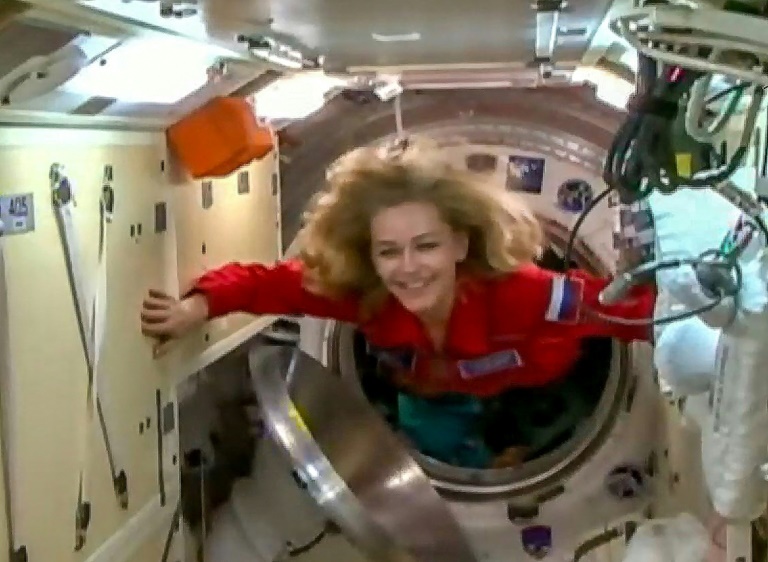A Russian actress and director arrived at the International Space Station (ISS) on Tuesday to begin a 12-day mission to make the first movie in orbit.
The Russian crew is set to beat a Hollywood project that was announced last year by “Mission Impossible” star Tom Cruise together with NASA and Elon Musk’s SpaceX.
Actress Yulia Peresild, 37, and film director Klim Shipenko, 38, took off from the Russia-leased Baikonur Cosmodrome in ex-Soviet Kazakhstan as scheduled.
They docked at the ISS, behind schedule at 1222 GMT, after veteran cosmonaut and captain of their spacecraft, Anton Shkaplerov, switched to manual control.
As the hatches opened, the Russian trio floated into the orbital station where they were greeted by two Russian, a French, a Japanese and three NASA astronauts.
“Welcome to the International Space Station,” Russian cosmonaut Oleg Novitsky tweeted from the ISS.
The crew travelled in a Soyuz MS-19 spaceship to film scenes for “The Challenge”.
The movie’s plot, which has been mostly kept under wraps along with its budget, centres around a female surgeon who is dispatched to the ISS to save a cosmonaut.
Shkaplerov, 49, and the two Russian cosmonauts already aboard the ISS are said to have cameo roles in the film.
Konstantin Ernst, the head of the Kremlin-friendly Channel One TV network and a co-producer of the film, said he spoke with the crew as soon as they docked.
“They are in good spirits and feel well,” Ernst told AFP.
– ‘It was difficult’ –
“It was difficult psychologically, physically and emotionally… but I think when we reach our goal all the challenges won’t seem so bad,” Peresild — who was selected out of 3,000 applicants for the role — said at a pre-flight press conference.
Shipenko and Peresild are expected to return to Earth on October 17 in a capsule with Novitsky, who has been on the ISS for the past six months.
Ernst told AFP that a film crew will document their landing, which will also feature in the movie.
If successful, the mission will add to a long list of firsts for Russia’s space industry.
The Soviets launched the first satellite Sputnik, and sent the first animal, a dog named Laika, the first man, Yuri Gagarin, and the first woman, Valentina Tereshkova, into orbit.
“Space is where we became pioneers, where despite everything we maintain a fairly confident position,” Kremlin spokesman Dmitry Peskov told reporters Tuesday.
But compared with the Soviet era, modern Russia has struggled to innovate and its space industry is fighting to secure state funding with the Kremlin prioritising military spending.
Its space agency is still reliant on Soviet-designed technology and has faced a number of setbacks, including corruption scandals and botched launches.
Russia is also falling behind in the global space race, facing tough competition from the United States and China, with Beijing showing growing ambitions in the industry.
– Russians ‘lost interest’ –
Roscosmos was also dealt a blow after SpaceX last year successfully delivered astronauts to the ISS, costing Russia its monopoly for journeys to the orbital station.
For political analyst Konstantin Kalachev, the space film is PR and a way to “distract” Russians from the “problems” that Roscosmos is facing.
“This is supposed to inspire Russians, show how cool we are, but I think Russians have completely lost interest in the space industry,” Kalachev told AFP.
In a bid to spruce up its image and diversify its revenue, Russia’s space programme revealed this year that it will be reviving its tourism programme to ferry fee-paying adventurers to the ISS.
After a decade-long pause, Russia will send two Japanese tourists — including billionaire Yusaku Maezawa — to the ISS in December, capping a year that has been a milestone for amateur space travel.
Last month, SpaceX completed the first all-civilian mission to space that took four untrained astronauts on a three-day loop around the Earth’s orbit.
The trip followed billionaire Richard Branson’s several minutes in weightlessness in July, with Amazon founder Jeff Bezos completing a similar mission days later.
Later this month, 90-year-old actor William Shatner, known for his portrayal of Captain Kirk in the Star Trek series, will fly to space on a mission with Bezos’s Blue Origin.









